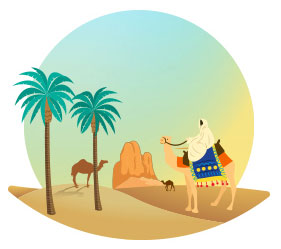Yusuf, Son of Ibn Al-Jawzi
Yusuf, Son Ibn Al-Jawzi (1): Abu Al-Muhasin Yusuf Bin Jamal Al-Din Abdel-Rahman Bin Ali Bin Muhammad Bin Ali Bin Ubaydullah Bin Abdullah Bin Hamadi Bin Ahmed Bin Muhammad Bin Ja’far Al-Jawzi Bin Abdullah Bin Al-Qasim Bin Al-Nadhr Bin Al-Qasim Bin Muhammad Bin Abdullah Bin Abdel-Rahman Bin Al-Qasim Bin Muhammad Bin Abi Bakr Al-Siddiq of Baghdad was a Hanbali from the tribe of Taym, a sub-clan of the tribe of Quraysh, and a descendant of Abu Bakr Al-Siddiq. He was known as Muhi Al-Din Al-Sahib and was the head teacher at Dar Al-Khilafa in Baghdad. He was born on a Saturday, on the 12th of Dhul Qi’dah in 580 AH.
Yusuf’s father died when he was 17 years old, whereupon the mother of Khalifa Al-Nasr provided him with support. He was educated under the tutelage of his father and others. He oversaw the institution of hisbah (regulating the marketplace) on both sides of Baghdad and also monitored public endowments. Several letters he wrote on behalf of the royal court were sent to Egypt, Rome, the Levant, the Far East, Mosul, and Upper Mesopotamia. He transmitted hadiths in Baghdad, Egypt, and elsewhere.
When Al-Mustansir sent Yusuf with a letter to Aleppo in 634 AH, the king there died. Then when he sent him with a letter to Rome, their leader died as well. In 635 AH, the same thing happened when he sent a letter to King Al-Ashraf, and his brother, Al-Aadil, also died upon receiving a letter from him. As a result, people became wary of his visits to them, leading Abu Al-Qasim Al-Sinjari to say:
Tell the caliph to have mercy –
And you may last for a long time.
You sent a messenger from amongst them –
And his messenger is the Angel of Death!
Yusuf was a prominent imam and an esteemed figure who was knowledgeable about the Hanbali madhab, memorized large amounts by heart, and was always keen to gain knowledge. He was a skilled preacher and a well-spoken man known for being calm, composed, and a person of great honor and nobility. He was educated according to the Hanbali school of thought and received knowledge from his father, the great scholar Abdel-Rahman Ibn Al-Jawzi, and others. He was in charge of teaching the Hanbalis in the Mustansiriya Madrasah in 632 AH.
Yusuf established the Jawziyyah Madrasah in Damascus and endowed it to the Hanbalis. He taught, issued fatwas, wrote, and narrated hadiths in Baghdad, Damascus, Egypt, and elsewhere. Kings and other prominent figures showered him with honor, respect, and generosity. He had an excellent reputation and was well-liked by the public. He recited the Qur’an using the ten different methods of recitation under the supervision of Al-Baqillani in Wasit when he was just over ten years old and held preaching sessions in Baghdad like his father, Abdel-Rahman Ibn Al-Jawzi. In Safar of 656 AH, he and his three sons were slain in Baghdad, in the camp of the King of the Tatars. Yusuf’s sons were:
· The Honorable Sheikh Jamaluddin Abu Al-Faraj Abdel-Rahman, a brilliant man and preacher who wrote books. He was killed when he was over 50 years of age.
· Sharaf Al-Din Abdullah, who was also in charge of the hisbah, which he then abandoned in order to devote himself to teaching.
· Tajuddin Abdul-Karim, who was assumed responsibility over the hisbah when his brother left it. He also taught and was killed before he reached the age of twenty.
The authored works of Ibn Al-Jawzi’s son include: Ma’adin Al-Ibriz fi Tafsir Al-Kitab Al-Aziz, Al-Madhab Al-Ahmad fi Madhab Ahmad, and Al-Idah fi Al-Jadal. He was also a skilled poet.
Source: Kitab Al-Sulala Al-Bakria As-Siddiqia – Part II, by Ahmed Farghal Al-De’abassi Al-Bakri
Date of Publication
1 Ramadan 1438 AH / May 26, 2017 AD
(1) Tarikh Al-Islam, Tadmouri Ed. 48/ 306-308, Dhayl Mir’at Al-Zaman 1/ 332-241, ‘Iqd al-Juman fi Tarikh Ahl al-Zaman 1/ 44-45, Al-‘Ibr fi Khabar min Ghabr 3/ 285, Al-Bidaya Wal Nihaya, Ihiaa Al-Turath Ed. 13/ 244, Nuzhat Al-Anam fi Tarikh Al-Islam pp. 251-252, Silat Al-Takmila li-Wafayat Al-Naqala 1/ 373-374, Al-Wafi Belwafiat 29/ 104-106, Fawat Al-Wafiyat 4/ 351-353, Sullam Al-Wusul ila Tabaqat Al-Fuhul 3/ 405, Tabaqat Al-Mufassirin, by Al-Dawudi 2/ 380-383, Al-A’lam, by Al-Zarkali 8/ 236-237, Al-Dars fi Tarikh Al-Madaris 2/ 23, Shatharat al-Thahab Fi Akhbar Min Dahab 7/ 494-496
